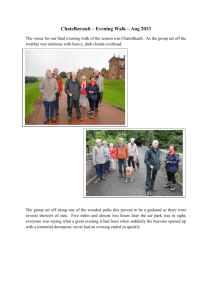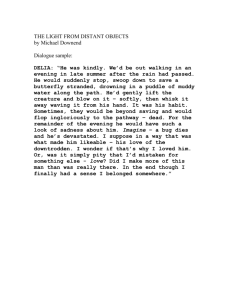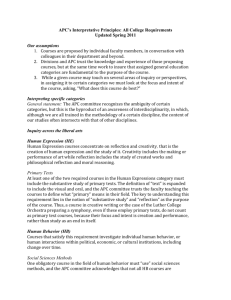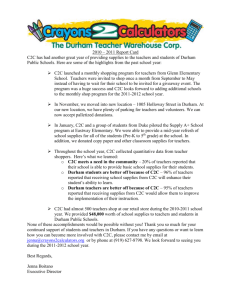APC00-10-19M - University of Windsor
advertisement
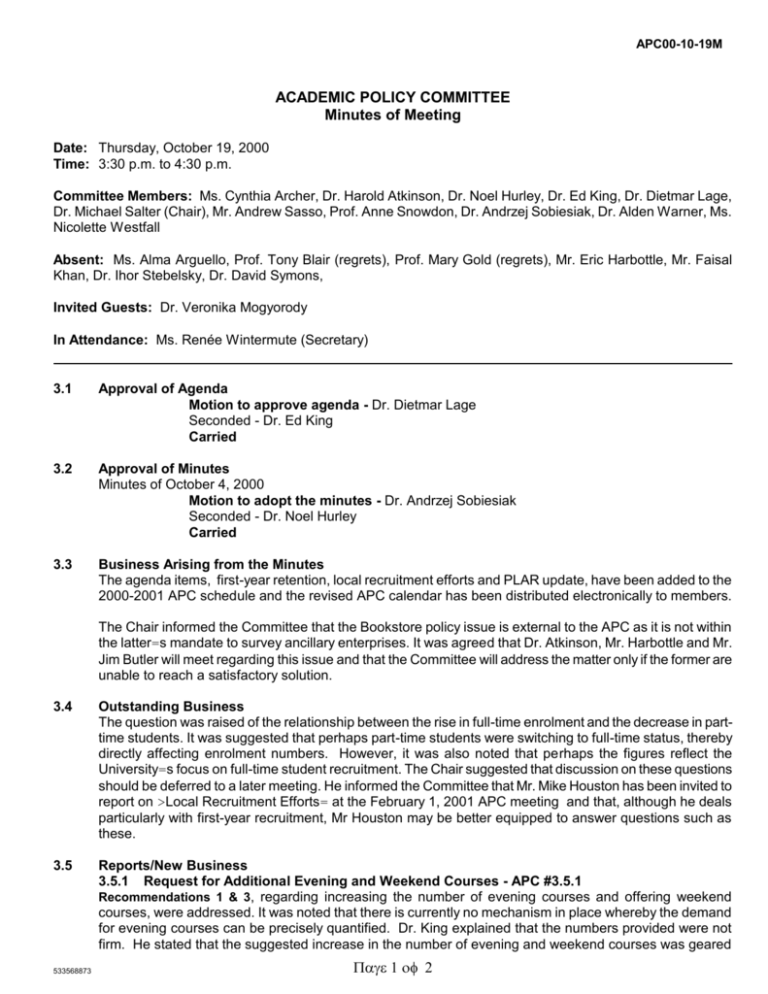
APC00-10-19M ACADEMIC POLICY COMMITTEE Minutes of Meeting Date: Thursday, October 19, 2000 Time: 3:30 p.m. to 4:30 p.m. Committee Members: Ms. Cynthia Archer, Dr. Harold Atkinson, Dr. Noel Hurley, Dr. Ed King, Dr. Dietmar Lage, Dr. Michael Salter (Chair), Mr. Andrew Sasso, Prof. Anne Snowdon, Dr. Andrzej Sobiesiak, Dr. Alden Warner, Ms. Nicolette Westfall Absent: Ms. Alma Arguello, Prof. Tony Blair (regrets), Prof. Mary Gold (regrets), Mr. Eric Harbottle, Mr. Faisal Khan, Dr. Ihor Stebelsky, Dr. David Symons, Invited Guests: Dr. Veronika Mogyorody In Attendance: Ms. Renée Wintermute (Secretary) 3.1 Approval of Agenda Motion to approve agenda - Dr. Dietmar Lage Seconded - Dr. Ed King Carried 3.2 Approval of Minutes Minutes of October 4, 2000 Motion to adopt the minutes - Dr. Andrzej Sobiesiak Seconded - Dr. Noel Hurley Carried 3.3 Business Arising from the Minutes The agenda items, first-year retention, local recruitment efforts and PLAR update, have been added to the 2000-2001 APC schedule and the revised APC calendar has been distributed electronically to members. The Chair informed the Committee that the Bookstore policy issue is external to the APC as it is not within the latter=s mandate to survey ancillary enterprises. It was agreed that Dr. Atkinson, Mr. Harbottle and Mr. Jim Butler will meet regarding this issue and that the Committee will address the matter only if the former are unable to reach a satisfactory solution. 3.4 Outstanding Business The question was raised of the relationship between the rise in full-time enrolment and the decrease in parttime students. It was suggested that perhaps part-time students were switching to full-time status, thereby directly affecting enrolment numbers. However, it was also noted that perhaps the figures reflect the University=s focus on full-time student recruitment. The Chair suggested that discussion on these questions should be deferred to a later meeting. He informed the Committee that Mr. Mike Houston has been invited to report on >Local Recruitment Efforts= at the February 1, 2001 APC meeting and that, although he deals particularly with first-year recruitment, Mr Houston may be better equipped to answer questions such as these. 3.5 Reports/New Business 3.5.1 Request for Additional Evening and Weekend Courses - APC #3.5.1 Recommendations 1 & 3, regarding increasing the number of evening courses and offering weekend courses, were addressed. It was noted that there is currently no mechanism in place whereby the demand for evening courses can be precisely quantified. Dr. King explained that the numbers provided were not firm. He stated that the suggested increase in the number of evening and weekend courses was geared 533568873 12 APC Minutes: October 19, 2000 APC00-10-19M more toward an increase in the variety of courses offered so that non-traditional students could complete their program in a more timely fashion. Given this, members agreed that a rotation between day and night courses could be implemented thereby ensuring variety and ensuring that there would be no consequent decrease in full-time day courses. Members were informed that due to the current distinction between distributive course models (webdelivered courses, distance education courses, etc.) and residency requirement courses, possible flexible learning solutions regarding the issue of evening and weekend courses must abide by the residency component. Members also noted that it may be unreasonable to suggest an increase in evening courses for all disciplines. AAUs need to examine the specific needs of their students and to tailor course offerings accordingly. Regarding weekend courses specifically, members stated that in the past student attendance had not been favourable and that three consecutive hours or more in a classroom may negatively affect the efficiency and concentration of the instructor and the students. Dr. Mogyorody stated that possible lifestyle and family implications must also be taken into account when examining flexible learning issues. For instance, demographically, parents and caregivers generally prefer weekend courses while faculty may find that these course offerings impinge on the little time they have with their families. The Chair suggested that the Working Group, working with the Centre for Flexible Learning (CFL), further examine these issues. Members agreed that more qualitative and quantitative data should be collected from both faculty and, traditional and non-traditional students. It was agreed that the Working Group would report back to the APC at the February 14, 2001 meeting. Discussion turned to recommendation 2. It was agreed that AAUs, in consultation with the Office of the Registrar, should take the initiative with this matter. The former should be requesting faculty and student feedback on potential evening time slots and when possible setting the schedule accordingly. It was further suggested that AAUs should also start requesting feedback on weekend and evening courses and other flexible learning models. It was agreed that the Chair, Dr. King and Dr. Mogyorody will formulate a letter to AAUs requesting that they consider increasing both the level and number of evening/weekend courses next year. 3.5.2 Distance Education and How Sarnia and Chatham Fit Into the General Plan The Working Group, chaired by Dr. Lage, will be ready to report on this issue at the next APC meeting. Action: Distance Education information from the CFL will be sent to the secretary and circulated to the membership for the next meeting. 3.6 Question Period/Other Business Members were informed that Dr. Warner, acting on behalf of the Chair and APC, will be tabling the IT Report at the November 16, 2000 Senate meeting. Dr. Veronika Mogyorody and Mr. Roger Lauzon will be present to answer any questions. 3.7 Adjournment Motion to adjourn - Dr. Harold Atkinson Seconded - Prof. Anne Snowdon Carried 533568873 22

